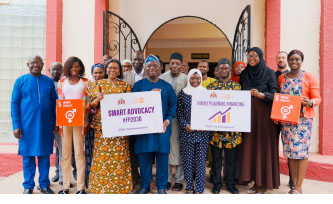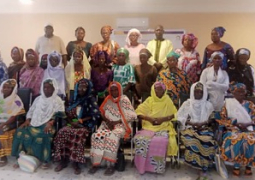
The event seeks to strengthen advocacy around UNFPA supplies' new financing model, which supports countries in increasing domestic financing for quality-assured reproductive health/family planning (RH/FP) commodities. It also part of the UN agency’s advocacy strategies, being aptly manifested in the three transformative areas they have been engaged in namely; preventing maternal death, ending the unmet need for family planning and ending Gender-based Violence.
Moreover, the event also seeks to build the capacity of national coalition team in using the SMART advocacy to influence family planning services across the country.
Welcoming the gathering, Ndey Rose Sarr, UNFPA country rep, reminded that as policymakers, healthcare providers, educators and advocates, they have a responsibility to ensure that family planning services are accessible, affordable, and of high quality.
“We must invest in comprehensive education and outreach programs to dispel myths and break down barriers. We must ensure that family planning is integrated into the national health budget and development plans. The Gambia has made commitments to FP2020/FP2030 to ensure an uninterrupted supply of family planning commodities at all levels of care, to increase the contraceptive prevalence rate, and reduce unmet need in the country.”
This commitment, she added, needs to be fulfilled by the government and as policymakers and health providers, they have a significant role to play.
She thus called on all to take advantage of the forum to develop actionable advocacy strategies that will promote investment and allocation of financing for family planning, ensuring that every individual has access to and the means to make informed choices about their reproductive health.
Deputising for the Minister of Health, Babanding Sabally, Deputy Permanent Secretary at the Ministry, recalled that the partnership between UNFPA and the Ministry statred decades ago and since then has been flourishing well.
“Before, I became DPS, I was overseeing the National Pharmaceutical Services, which takes care of the national public health supply chain. I can attest to that UNFPA has been one of our leading supporters when it comes to reproductive and lifesaving maternal medicines. And they are second to Global Fund only when in support of our public health supply chain. So, all the gains we are now experiencing in The Gambia in terms of public health supply chain, one way or the other is attributed to UNFPA.”
The theme for national health quality 2021-2030, he added, calls for building partnership for quality health care delivery, saying they want to nurture and strengthen this partnership to contribute to quality health service delivery in the country.
Also speaking, Mathew Cummins WCARO, a consultant, spoke about the benefits of the SMART initiative, recalling that he joined UNFPA about nine months ago and before that he had never thought about the potential implications of family planning.
“And as I spent the last nine months reviewing studies, analysing data and interacting with programmes across the region, I come to view that family planning to social and economic development is almost as important as food and water to the growth of human body.”
He shared that ‘if we can manage to address the unmet need and ensure that every woman as well as their partners have access to preventive reproductive services,’ then the country can deliver so many transformational benefits.
The country, he added, will not completely address maternal mortality and prevent all infant deaths, but will also address countless unsafe abortions.
That, he believes, would greatly help the country in strengthening and building the much-needed human capital which, he said, has an important consequence on the country’s economy.





